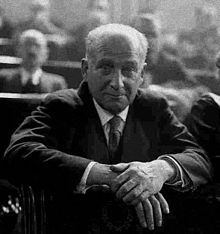Francisco Largo Caballero
| Francisco Largo Caballero | |
|---|---|
 |
|
| 66th Prime Minister of Spain | |
|
In office 4 September 1936 – 17 May 1937 |
|
| Preceded by | José Giral Pereira |
| Succeeded by | Juan Negrín López |
| Personal details | |
| Born |
15 October 1869 Madrid |
| Died | 23 March 1946 (aged 76) Paris, France |
| Political party | PSOE |
Francisco Largo Caballero (15 October 1869 – 23 March 1946) was a Spanish politician and trade unionist. He was one of the historic leaders of the Spanish Socialist Workers' Party (PSOE) and of the Workers' General Union (UGT). In 1936 and 1937 Caballero served as the Prime Minister of the Second Spanish Republic during the Spanish Civil War.
Born in Madrid, as a young man he made his living stuccoing walls. He participated in a construction workers strike in 1890 and joined the PSOE in 1894. Upon the death in 1925 of party founder Pablo Iglesias, he succeeded him as head of the party and of the UGT.
Moderate in his positions at the beginning of his political life, he advocated maintaining a degree of UGT cooperation with the dictatorial government of General Miguel Primo de Rivera, which permitted the union to continue functioning under his military dictatorship (that lasted from 1923 to 1930). This was the start of his political conflict with Indalecio Prieto, who opposed all collaboration with the dictatorial regime.
He was Minister of Labor Relations between 1931 and 1933, in the first governments of the Second Spanish Republic, headed by Niceto Alcalá-Zamora, and in that of his successor Manuel Azaña. He enjoyed great popularity among the masses of workers, who saw their own austere existences reflected in his way of life.
In the elections of 19 November 1933, the right-wing Spanish Confederation of the Autonomous Right (CEDA) won power in Spain. The government nominally led by the centrist Radical Alejandro Lerroux was dependent on CEDA's parliamentary support. Responding to this reversal of fortune, Largo abandoned his moderate positions, began to talk of "socialist revolution", and became the leader of the left (Marxist and revolutionary) wing of the UGT and the PSOE. In early October 1934, after three CEDA ministers entered the government, he was one of the leaders of the failed armed rising of workers (mainly in Asturias) which was forcefully put down by the CEDA-dominated government.
...
Wikipedia
